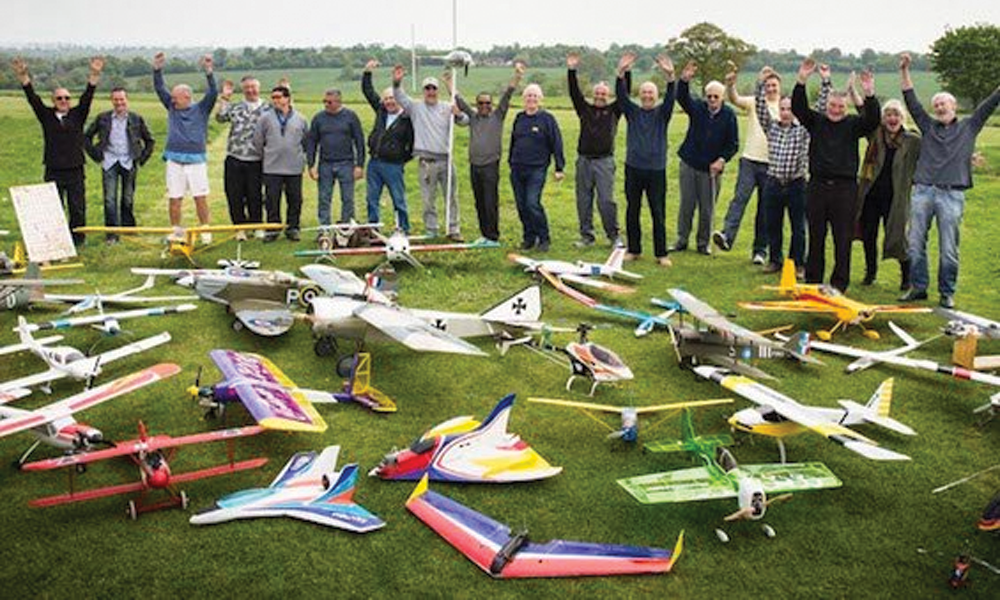
You may be a park flyer and say to yourself that this doesn’t apply to me. I guarantee you that it does and there are very good reasons for you to follow these rules. I encourage you to read on and share this with your friends and fellow pilots. I’ll break this into two parts, Park Pilots and Club Pilots.
Park Pilots
So you decided to fly in a local reserve to avoid club politics, rules or perhaps you wanted to save a few bucks? Truth is, people are there to fly and the rules are generally about safety. Not only that but the facilities are better than what you’ll find in a park.
If you have managed to find yourself in an area from which to fly you’ll need to be a good model citizen and make sure you are respecting your neighbours. Take extra precautions not to upset those around you. For instance, if you started flying at 6:00, the neighbours are going to be far from appreciative and they are going to try and move you on. This means a local ranger or police officer is going to be dispatched to deal with you. Once you’ve been booted, that’s it.
- Respect the neighbours and their privacy.
- Don’t fly over homes.
- Respect other park users.
- Don’t fly over or near people.
- Don’t fly in a reckless manner
- Don’t leave your rubbish.
- Don’t fly early in the morning or into the evening.
- Don’t fly noisy planes.
- Leave the area quietly.
- Mind your language.
- Be friendly, say hello.
- Don’t be a pest.
Life is not easier for the park aviator because you’re always on borrowed time. At some point, a range or police officer will move you on. Unless you have the landowners' permission you may not be insured either. Damaging property or a person is going to be costly so not having insurance means you are self-insuring.
Club Pilots
Club culture is one of the most important assets a club can possess. The responsibility to cultivate and promote a healthy club culture falls on to the members and the committee. Failure value and promote a healthy culture leads to conflict and in the end the death of a great club. Conflict is present in even the friendliest clubs and there can be all sorts of reasons for this. When you get a few dozen people together there are bound to be tensions from time to time. A little conflict is normal but it can get out of hand and before you know it you can be dealing with a much bigger issue. People rarely wake up one morning and simply dislike someone. There is generally a root cause, for example, someone did something that another person considered disrespectful or discourteous and therefore guilty of breaking one of the unwritten rules of RC flying etiquette.
People try to avoid conflict and rarely go out of their way to be disrespectful or offend others. For this reason, you may find the one party did not even know his/her actions upset anybody and thereby often repeats it. I have spent a great deal of time serving on committees over the last 10 years and there are some common unwritten rules that all modellers should be aware of. Most are common sense but as we know, common sense is not so common.
General Etiquette
- Respect for your club and fellow club members is of paramount importance. Members of a club must be respectful of one another for a club to function as a cohesive unit. Members of a club that exhibit disrespectful behaviour should be shown the door. Protect the culture of your club and ensure new members are an added benefit to the social fabric of the club.
- Respect your neighbours that live close to your flying field. If your activities impact on the use of their property you will lose your field. Make sure your aircraft is quiet and pull up anyone at your field who is flying with a noisy aircraft. Some people are far too polite to say something, so if you think your aircraft might be noisy I can guarantee you members of your club think it is.
- Do not fly over the homes of your neighbours or invade their privacy. Again, if your activities impact on the use of their property you will lose access to your field. If you see someone flying out of bounds you should say something. If you see the behaviour continuing to get the club committee involved.
- Rather than complaining about not liking the rules of your club, do one of three things. Leave, accept the rules, or run for a position on the committee at the next AGM (Annual General Meeting) and change the rules. Do not undermine your fellow club members or committee members.
 Do not fly early in the morning or into the evening if your neighbours could possibly or even remotely hear you. Although you enjoy the sound of your model aircraft I guarantee your neighbours do not.
Do not fly early in the morning or into the evening if your neighbours could possibly or even remotely hear you. Although you enjoy the sound of your model aircraft I guarantee your neighbours do not.- Do not fly in a reckless manner. Whilst it’s fine to tear up the sky do it in a responsible manner. Be in full control of the aircraft; fly to the best of your abilities but not beyond them. The last thing you want is your fellow club members to be cowering in a corner or for members of the public to be concerned. We have all seen reckless flying and we all felt uncomfortable as a result. If you see something, say something.
- Be aware that when starting up large aircraft it may stir up dirt and debris which may be thrown in the general direction of the public or your fellow club members. Make sure you are clear and that people in the vicinity are aware you are about to start your aircraft. Be aware of exhaust fumes and if you’re going to be running in the pits for extended periods move to an area where you’re not likely to offend anyone.
- Don’t leave rubbish at your club. This includes broken props, batteries, and the carcass of a previously flyable aircraft. This is really about showing respect for your fellow club members and your club. Leave it as you found it!
- Animals are best left at home. I’ve seen a dog chase a ball and run right through half a dozen planes. The damage was totally avoidable but if you really must take a very well behaved companion to the field, you must make sure it is on a lead. Don’t forget to pick up after your animal friends because your fellow club members are going to run out of patience quickly.
- It’s good to see kids at the flying field so keep the language clean! If you bring kids along remember that you need to keep an eye on them at all times to keep them out of trouble. Kids have a habit of sneaking up on you and listening in to the goings-on. Many people bring their kids or grandkids so be mindful of this.
- Leave the area quietly
- Mind your language and be friendly, say hello and don’t be a pest.
- Nobody likes a know-it-all so don't be one. If you're asked a question by all means reply but forcing your opinions on others is just annoying.
Flight Line Etiquette
- When walking in proximity of the flight line or onto the field to retrieve an airplane, avoid walking directly in front of other flying pilots and make sure you are communicating with those flying planes. Make sure they know you are on the flight line because if it all goes wrong, the results are devastating. Be mindful that older ears might not be as sensitive as younger ones so be loud and call your intentions. I’ve never heard a complaint that someone was too loud when calling out the intention to walk on the strip but I’ve heard plenty of people say they didn’t hear anyone say they were on the strip.
- Call out your intentions or difficulties to others that are flying.
- Taking off left to right
- Landing left to right
- Touch and go
- On the field or on the Strip
- Off the field or off the strip
- Urgent - Dead Stick
- Low Voltage - Coming in for a landing
- Lost Control - Be sure to yell this out so that others visually track the final destination. Others that are not flying may be able to assist you in locating it.
- Deadstick and low voltage calls have priority over all other calls. Give landing aircraft priority use of the runway and the airspace immediately surrounding should a go-around be necessary.
- Retrieve your aircraft and clear the strip immediately. This is not an area where you should start discussing repairs or what went wrong. This is a dangerous area and the longer you are there the greater the risk to you.
- Never stalk or interfere with a trainee pilot. When you are learning to fly there is a lot going on and being buzzed by another pilot is unhelpful and just plain wrong. Give a student pilot’s plenty of airspace when flying.
- Do not touch other peoples equipment unless it is to move it out of immediate harm. Do not for any reason adjust the equipment of a fellow modeller without permission. There is no good reason for this to take place. If you notice something that is a safety issue you should let the modeller know. I am sure they would be more than happy to discuss your concerns or comments.
- Flying can be quite taxing on the grey matter so whilst some pilots love a chat whilst flying others like to avoid it. Often pilots go quiet on landing and I must confess that I am one of those pilots.
- When flying in the pilot box be sure to stand back away from the front so that another pilot can lean forward for a better view if required when lining up for a landing.
- Downed aircraft can be a common occurrence so why not help out a fellow pilot. Often you need to search through long grass and it's better if two people are searching so that someone can raise the alarm if help is required. You never know when you will be searching for a downed aircraft so pay it forward.
- Don’t hog the flight line with 3d flying. Whilst no one will begrudge you, a couple of flights you are holding up the rest of the pilots getting up in the air. Whilst your flying is impressive the first few times people see you ply your trade it does wear thin.
We have talked about many different issues that are the cause of conflict at even the most friendly model club. Start thinking about how your behaviour can impact the culture of your club and what you can do to improve the club. Lead by example and encourage others to follow the unwritten rules. Perhaps forward this article to your club members or discuss the contents at your next meeting. The point of this article is to get pilots to think about their own actions and routines. No matter how many years you have been flying there is always room for improvement.
Written by gozerian
Hear it First: Join our Mailing List
Sign up to receive new product updates, exclusive discounts, news, and more!

